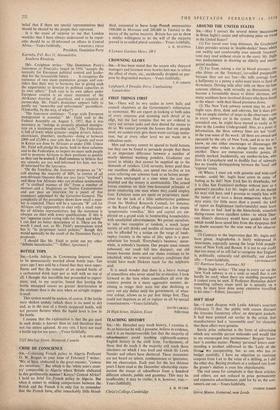AROUND THE UNITED STATES
SIR,—May I correct the several minor inaccuracies in Brian Inglis's recent and refreshing piece on travel in the United States?
(1) For travel over long distances, the Greyhound Lines provides service in 'double-decker' buses which. run swiftly and comfortably over smooth 'freewaYs (one may read without strain to the eyes). Mr. Inglis was misfortunate in drawing an elderly and uncon' genial machine.
(2) Far from risking a rise in blood pressure, one who drives on the 'freeways.. (so-called presumably because they are not free—the tolls average from a halfpenny to a penny a mile) must learn to fend off drowsiness. Driving mile after mile on these six-lane concrete ribbons, with virtually no distractions, can become a formidable threat to driver alertness, and many accidents have involved drivers who have dozed at the wheel—with their blood pressures down. (3) The New York subway system may be, as Mr. Inglis says, dirty, dank and odorous, but it does pro- vide an ample number of maps to the observant—one in every subway car in the system. Had Mr. Inglis consulted one, he might have moved as easily as he does in the London Underground. Also, as a point of information, the three subway lines are not 'rivals' in the true sense of the word : all three are owned and operated•by the city of New York, and in so far as I know, no one either encourages or discourages the passenger who wishes to change from one line to another. There are numerous transfer points, all plainly marked. Incidentally, my mother-in-law, who lives in Canajoharie and in deathly fear of subways, has no trouble distinguishing between the 'local' and 'express' trains. (4) Where, I must ask with genuine and wide-eyed wonder, could Mr. Inglis have eaten to come off feeling as he did? New York has its drawbacks, but it is (like San Francisco) perhaps without peer as a gourmet's paradise. Let Mr. Inglis call on me during his next visit here, and I promise to supply him with the names of at least a dozen restaurants where he may enjoy, for little more than a pound. the kind of repast an Englishman (unfortunately) must leave his shores to find. And in the hinterlands, countless dining-rooms serve excellent tables—to which Dun' can Hines's directory would have guided him and which would have saved him from the dyspepsia that no doubt accounts for the sour tone of his observa- tions.
(5) Contrary to the impression that Mr. Inglis may have given, Anglophobia is fairly widespread in Americans, especially among the large Irish popula- tions of New York and Boston. It is not to our credit that too many of us still fail to recognise that England is, politically, culturally and spiritually, our closest ally.—Yours faithfully, LEO HAMALIAN 351 Harrison Street, Paramus, NJ
[Brian Inglis writes : 'The map in every car on the New York subway is on a scale so small that it can hardly be read; when there are standing passengers it cannot even be seen. If Professor Hamalian defers consulting railway maps until he is actually on a train, he must have done some extensive travelling in his time.'—Editor, Spectator.]






























 Previous page
Previous page